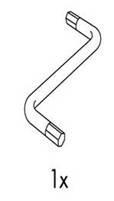What do I mean by this? Well the next two-thousand years of history are filled with great examples of good and evil.
Righteousness and wickedness.
Happiness and sadness.
Clearly the 'war in heaven' you've read about here continued.
As soon as Adam and Eve taught their children right from wrong, and all the principles of the gospel, Satan started spreading lies, and turning many toward evil. This was even before Cain and Abel were born (who were not the first two kiddies, by the way ...)
"From the time of the Fall the people of the world began moving in two opposite directions. One group followed the teachings of Adam and Eve and continually strived for increasing righteousness and perfection. The other group yielded to the deceitful enticings of Satan and his servants and moved deeper and deeper into depravity and wickedness. Both these divergent paths were followed to their ultimate ends." [1]
So both good and evil perpetuated in Adam's posterity.
See:
As you study the effects of the Fall, and the lives of Adam's posterity, you realise that - yes, we’ve been shut out of the physical presence of God, but it's disobedience that leads men even further away from God.
Do you remember the story of Abel and Cain?
And Adam knew Eve his wife; and she conceived, and bare Cain, and said, I have gotten a man from the Lord.
And she again bare his brother Abel. And Abel was a keeper of sheep, but Cain was a tiller of the ground.
And in process of time it came to pass, that Cain brought of the fruit of the ground an offering unto the Lord.
And Abel, he also brought of the firstlings of his flock and of the fat thereof. And the Lord had respect unto Abel and to his offering:
But unto Cain and to his offering he had not respect. And Cain was very wroth, and his countenance fell.
And the Lord said unto Cain, Why art thou wroth? and why is thy countenance fallen?
If thou doest well, shalt thou not be accepted? and if thou doest not well, sin lieth at the door. And unto thee shall be his desire, and thou shalt rule over him.
And Cain talked with Abel his brother: and it came to pass, when they were in the field, that Cain rose up against Abel his brother, and slew him.
And the Lord said unto Cain, Where is Abel thy brother? And he said, I know not: Am I my brother’s keeper?
And he said, What hast thou done? the voice of thy brother’s blood crieth unto me from the ground.
And now art thou cursed from the earth, which hath opened her mouth to receive thy brother’s blood from thy hand;
When thou tillest the ground, it shall not henceforth yield unto thee her strength; a fugitive and a vagabond shalt thou be in the earth.
And Cain said unto the Lord, My punishment is greater than I can bear.
Behold, thou hast driven me out this day from the face of the earth; and from thy face shall I be hid; and I shall be a fugitive and a vagabond in the earth; and it shall come to pass, that every one that findeth me shall slay me.
And the Lord said unto him, Therefore whosoever slayeth Cain, vengeance shall be taken on him sevenfold. And the Lord set a mark upon Cain, lest any finding him should kill him.
And Cain went out from the presence of the Lord, and dwelt in the land of Nod, on the east of Eden. (Genesis 4:1-16)
This is the first example the scriptures give us of wickedness, of Satan's real power in the world.
Cain’s offering was rejected by the Lord - most likely for several reasons - but the fact remains that his sacrifice was not done in faith, nor was it in the prescribed and revealed manner. He brought an offering of fruit, and he did it with a flippant attitude. An angel of the Lord taught Adam how sacrifices should be done: thou shalt do all that thou doest in the name of the Son, and thou shalt repent and call upon God in the name of the Son forevermore (Moses 5:8).
Cain later entered into an unholy covenant with Satan, by which he became known as Master Mahan, or “master of this great secret,” and by which he could “murder and get gain” (Moses 5:29–31). He and his descendants lived separately from the other descendants of Adam.
I thought it was interesting, however, that even after Cain’s unacceptable offering, the Lord did not reject Cain. No. Instead, the Lord gave Cain a hard and specific warning about the dangerous path he was walking. He was pretty much chastised by the Lord to get his act together.
But Cain continued to reject the Lord, and Satan engineered his downfall step by step until he reached the point where “he glorified in his wickedness” and killed his brother at the suggested on Satan.
And that is where it all started.
Coming soon .. an example of the wickedness in Cain's posterity, and the righteousness in Seth's posterity.
[1] Old Testament student manual, 4-26


































